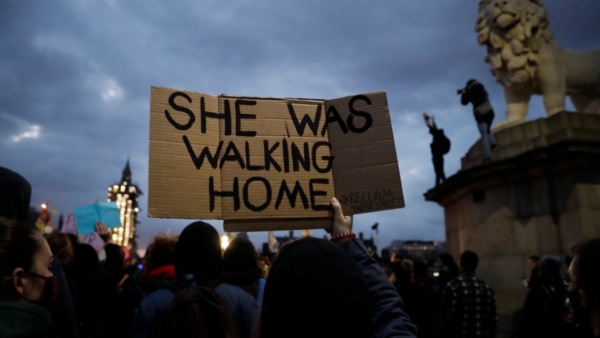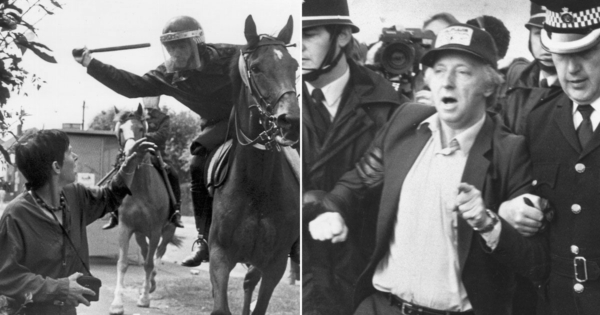End Points
The end of Nicola Sturgeon’s time in office and the end of Boris Johnson’s time in the limelight, alongside the marking of the three-year anniversary since we entered lockdown in the UK acts like a triptych of strange endings. Of course covid has not gone away, grotesque elite figures like Johnson will return and Sturgeon’s SNP will stagger on, but in an era characterised by churn and delirious ambiguity marking passages of time is needed to create meaning. This seems necessary as gaslighting about immigrants and state violence increases and the prospects of a Scottish democracy seem to fade in collective amnesia.
The IPCC report that we’re at the threshold of permanent and dire shifts in the planet’s climate system is met with barely a shrug of media or public interest. The Casey Review is published twenty five years after the McPherson Report in the aftermath of the murder of Stephen Lawrence found that police were institutionally racist, and the prospects for real change seem remote.
Casey concluded that:
- The Met had a bullying “boys’ club” culture in which predators flourished, with “too many places to hide”.
- The investigation of violence against women was so degraded that broken fridges were used to store rape victims’ samples, which then had to be thrown out.
- Women within the force were “traded like cattle” and moved to different units depending on which male officers found them attractive.
- An elitist culture prioritised specialist units such as firearms, leaving frontline policing “creaking at the seams”.
The review found the Met still used “eye-watering force” against black people and showed a “wilful blindness” to racism at all levels of the organisation. Nothing has been learnt, in fact the Met seems to be, if anything, worse, more violent, more racist, more misogynist, more homophobic and less accountable than a quarter of a century ago.

This is not so much about the depressingly unsurprising findings of a review into state violence, it is about the inability of British society, culture or institutions to change. This is mirrored elsewhere, indeed, everywhere.
As we mark the start of lockdown three years ago, nothing of the gains of that period are retained, celebrated or even remembered. The re-evaluation of work, the solidarity with ‘frontline workers’, the appreciation of nature and public space, the need to re-configure cities, the recognition of the need to radically and drastically decrease car use and air travel – and the realisation of our global interdependence – all has been lost, forgotten. Instead of the possibility of change and renewal, that sparked fleetingly into sight during the lockdown, this anniversary is marked by the uncovering (but mostly ignoring) of the realities of long-covid, the Ghost Children who have disappeared off school rolls, and the rise of covid-revisionism.
Now a new chorus of lockdown sceptics includes people who position themselves on the left, have joined the ranks of the libertarian right arguing that the public, who in fact strongly supported lockdown and even wanted to go further than the UK government did, were duped by an apocalyptic campaign of Big Pharma and the Deep State. While acknowledging the enormous costs of lockdown – up to £410bn – and according to one study, depression and anxiety tripled during the peak of the first lockdown – Richard Seymour points out that in the UK, a study found that lockdown reduced Covid-19 deaths by 86% and that: “A recent study in England found that roughly 20,000 lives would have been saved had the first lockdown been introduced just a week earlier.”
Seymour points to the bizarre phenomenon that such lockdown revisionism is now not the exclusive ground of the right but have been joined by a new cohort of lockdown sceptics includes people who position themselves on the left, such as the historian Toby Green and his colleague Thomas Fazi. Seymour points to the ‘apocalyptic tone’ of some of the claims being made. For example, Green and Fazi claim that vaccine resisters have been discriminated against in a manner unheard of since fascism. He writes: “A few years ago, this sort of boilerplate comparing Covid-19 responses to totalitarianism was the province of paranoid groupuscules like the White Rose, grotesquely named after an anti-Nazi resistance movement, and a few dull Spectator columnists. For such moral idiocy to be packaged for a leftwing audience is bizarre.”
This is where we are.
Learnt subordination, adaptation to humiliating living conditions, and embracing a reflective impotence are the hallmarks of our time. None of them are possible without institutional memory loss and mandatory individualism.
The alternatives seem incoherent at best. At a UK level Sir Keir Starmer quotes Thatcher as a virtue of upholding the ‘rule of law’ – an astonishing reflection for a Labour politician given her regime’s countless and exceptional breaking of law from the Belgrano Affair, to the Shoot to Kill policy, from the Battle of Orgeave to the Battle of the Beanfield, from the shooting of three IRA members in Gibraltar in 1988, to the use of the Official Secrets Act to try to prevent the publication of Peter Wright’s memoirs, to name just some of what she presided over.

Upholding the rule of law, Thatcher-style
But if the politics of Britain or Scotland seem overwhelmingly parochial desperate and useless, little of it matters if you draw back to a global perspective. This month saw the release of the final installment of the Intergovernmental Panel on Climate Change’s (IPCC) Sixth Assessment Report (AR6), an eight-year long undertaking from the world’s most authoritative scientific body on climate change. It was, predictably grim. Out of its findings there are one or two worth noting.
The IPCC tells us that: “Projected CO2 emissions from existing fossil fuel infrastructure without additional abatement would exceed the remaining carbon budget for 1.5C.”
Overshooting 1.5 degrees C, even temporarily, will lead to much more severe, oftentimes irreversible impacts. According to the World Resource Institute: “Rising global temperatures also heighten the probability of reaching dangerous tipping points in the climate system that, once crossed, can trigger self-amplifying feedbacks that further increase global warming, such as thawing permafrost or massive forest dieback. Setting such reinforcing feedbacks in motion can also lead to other substantial, abrupt and irreversible changes to the climate system. Should warming reach between 2 degrees C (and 3 degrees C, for example, the West Antarctic and Greenland ice sheets could melt almost completely and irreversibly over many thousands of years, causing sea levels to rise by several meters.”

Reflecting on his despairing news I came across this news story from Italy, in la Repubblica. The story is of two very wealthy ‘influencers’ Chiara Ferragni and Chiara Biasi who fly by helicopter to Switzerland to have photographs taken drinking an aperitif on a famously collapsing ice glacier, before its gone. The story has all the characteristics of our era: extreme opulence and immorality, a backdrop of banal celebrity and the spectacle of social media as an excuse for any behaviour at all.
This is a world out of time. We are living in what some people call a ‘lost future’ or others refer to as ‘the everlasting presence of contemporary madness’.

In 1953 Georg Lukas a major socialist thinker published his major work ,’ The Destruction of Reason’. In it he examines the close relation of irrationality to capitalism ,imperialism and fascism.. His description of irrationalism as the ” piling up of cynical contempt for humanity” he viewed in light of the Cold War. John Bellamy Foster the distinguished American Marxist has updated this sense of political irrationalism in today’s dystopian world in an important article in the New York published Monthly Review. Well worth a read and on- line.
Thanks Tom
A wonderful piece, Mike. Thank you!
Yes, pretty much.
These are the kinds of issues addressed in Troy Vettese and Drew Pendergrass’ book Half-Earth Socialism [aside: funny how ‘socialism’ doesn’t come up in my predictive text]: A Plan to Save the Future from Extinction, Climate Change, and Pandemics. They take sociobiologist EO Wilson’s proposal to set aside half the Earth for rewilding and develop their argument why that has to be a socialist project.
They also write (p16): “The eco-socialist future is female. To reach such a bright horizon, however, we need to deal with the widespread misogyny in contemporary socialist, environmentalist, and animal-rights organizations.”
If the book has a major flaw, it is in rejecting human population limits as Malthusian without explanation, and even their own global budgeting examples defeats their position on this. They also unfairly mocked Biosphere 2; failures are important learning opportunities in science. However I did learn worthwhile things from their philosophical, material, technical and imaginative chapters.
I think their system-of-systems approach is summed up in (p60): “Whatever the shortcomings of the utopian tradition, its strength lies in the capacity to link food, land, ecology and politics within a single analytical frame — an approach sorely lacking now.”
p78 “The goals of Half-Earth socialism are simple enough: prevent the Sixth Extinction, practise ‘natural geoengineering’ to draw down carbon through rewilded ecosystems rather than SRM, and create a fully renewable energy system.” Those three goals being complementary.
There is indeed much about which to – rightly – rage and despair. For a full picture, perhaps it is also worth acknowledging the amazing extent of recent and current collective action – strikes across multiple workplaces and ‘professions’, people re-discovering the importance of solidarity, trade unionism and the possibility of forcing positive change. Not a panacea, but a little light in the darkness. And we never know in advance what – possibly minor, apparently trivial – event/circumstance may lead to a greater rush of progress and a re-balance of power. Opportunity out of chaos… here’s hoping!
Yeah, fair comment Cathy, thanks
‘It is also worth acknowledging the amazing extent of recent and current collective action’
Equally noticeable has been the limitations of this solidarity. Middle class groups such as doctors and teachers go on strike to defend their own, comparatively privileged, position. No such solidarity is shown with cleaners and other less well paid workers in their workplace.
We have been here before. This was the story of trade union activism in the 1970s and 1980s, with a few honourable exceptions.
History repeating itself, first as tragedy, then as farce, as was said a couple of centuries back.
@florian albert, collective action can be reactionary, as in the gendered trade union split over equal pay for similar jobs (by reasonable, objective measures). It is still collective action.
The argument of biocrats is to extend the membership of ‘collective’ to the living world, now and in the continuing future, and for humans to act on behalf of that collective. Inter-human solidarity is a limitation we need to get beyond this century. Some environmental movements are showing the way.
I remember the porting and cleaning staff of the hospitals going on strike around 1980. I led a work in in 1982. the level of trade union membership has dropped dramatically since the 1970’s. Middle class professionals are reasonably well organised and are in reasonably secure employment.
Harder to organise defensive action amongst those with the contracts on offer by Uber, Amazon etc.
People on minimum wages, struggling to make ends meet need not only courage, but some element of financial support in order to withdraw labour. Having been ‘out on the stones’ on a number of times and supported others, I can reflect on that experience. I remember helping to deliver strike pay to the radiographers in the mid 70’s when they went on strike.
\Bill
Don’t Look Up.
There are serious issues within English society, that enables wealthy people to call the shots and leaves a lot of people disenfranchised and feeling powerless. I see people on the streets sleeping on the pavement or sleeping on park benches. I feel that Scotland, Wales and Ireland have a deeper understanding of their own countries but England is sadly divided between the haves and the have nots.